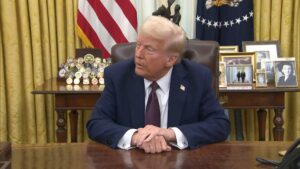British hip-hop group pioneers Muslim hip-hop, inspires new generation of artists
Pioneering British hip-hop group Cash Crew inspired a new generation of artists to blend faith and rap music
LONDON, UK (MNTV) – In the 1980s, a group of teenagers in Shepherd’s Bush, west London, broke barriers with their unique blend of breakdancing, beatboxing, and rap.
Known as Cash Crew, they combined themes of class, racism, and equality with a style that would help shape British hip-hop.
Although still in school, Cash Crew’s influence grew, with their pioneering blend of Islam and rap creating a distinctive genre: Muslim hip-hop.
“Islam has always been a part of hip-hop, but no one was doing what we were doing in the early 90s,” says Rakin Fetuga, Cash Crew co-founder, in an interview with Hyphen.
In 1992, they released The Provider, a track that fused Islamic chants with rap.
Despite controversy over the use of music in Islam, the song gained popularity on UK radio and was featured in Hip Hop Connection, marking the rise of a new subgenre.
Fetuga, raised in west London to a Nigerian Muslim father, was deeply influenced by “conscious” American hip-hop artists like KRS-One and Gang Starr.
He saw hip-hop as a platform to express social justice and Black identity. “It felt like an awakening, and the more we learned, the more we wanted to be part of it,” he recalls in his interview with Hyphen.
By 1985, Cash Crew signed with Virgin Records, but their 1991 debut Will It Make My Brown Eyes Blue? failed commercially, leading to their departure from the label.
The group’s conversion to Islam in 1992 led them to create The Provider, an important track in UK hip-hop that mixed Islamic faith with the genre’s cultural movements.
However, their music faced backlash, especially from parts of the Muslim community. “We were called haram,” Fetuga remembers.
Inspiring young generation of artists
Despite the criticisms, the group’s work inspired others.
In 1996, Fetuga teamed up with Ishmael Lea South to form Mecca2Medina, the first UK rap group dedicated to Islam. “We wanted to create a positive Muslim identity,” Fetuga says.
In the years following, British Muslim hip-hop gained momentum, despite rising Islamophobia.
“We became the nice face of Islam,” Fetuga says, as Mecca2Medina’s work resonated with younger Muslim artists.
Khaled Siddiq, a contemporary artist, points to Mecca2Medina as an influence, aiming to spread Islam’s positive message.
As the genre continues to evolve, Fetuga believes that the space for Muslim hip-hop is still growing. “The time is ripe for this music,” he says.
The legacy of Cash Crew and Mecca2Medina continues to inspire a vibrant Muslim hip-hop scene, bridging culture, faith, and music for future generations.










